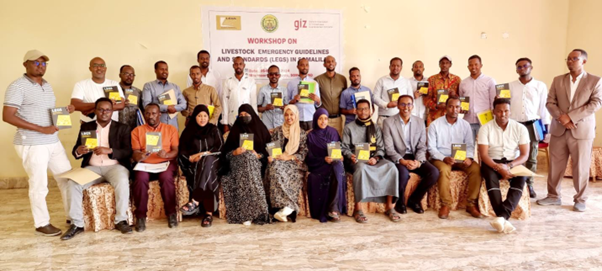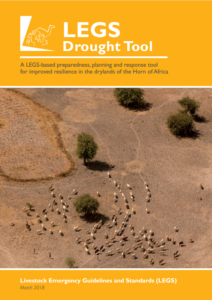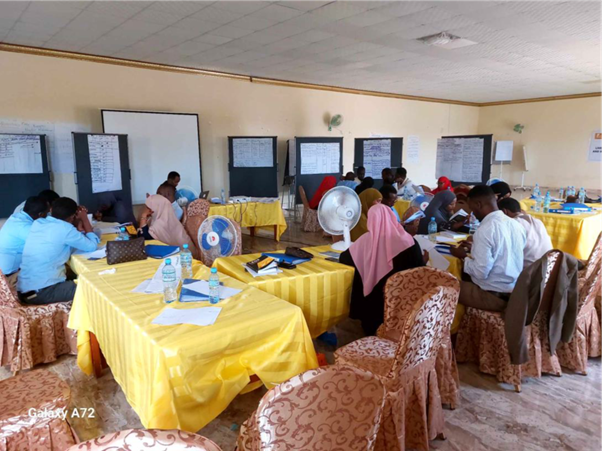 By Abdirahman Mohamed Ali, LEGS trainer
By Abdirahman Mohamed Ali, LEGS trainer
As an experienced LEGS (Livestock Emergency Guidelines and Standards) trainer, I’ve had the privilege of facilitating numerous training sessions over the years, but the recent series of LEGS trainings in Burao, Somaliland, between April and May 2024, stand out for a number of reasons. Supported by GIZ (Somaliland), these sessions marked the first instance – to my knowledge – where drought-specific mini-modules were integrated into the LEGS in-person core training based on the urgent challenges faced in the country at the time.
In this blog, I’ll share my personal experience of how these mini-modules improved the LEGS training. The introduction of half-day mini-modules in drought management and community participation offered a much-needed deep dive into critical issues that often challenge practitioners working in drought-prone, livestock-dependent areas like Somalia.
I’ll also explain why I believe they are essential for making sure we deliver the LEGS approach in the most relevant way, so that livestock-keeping communities receive the right support when they need it most. I hope this reflection will inspire others to incorporate these modules into their LEGS training or explore the associated LEGS e-modules.

LEGS Training Session participants with the Handbook, Burao, Somaliland 2024. Credit: Abdirahman Mohamed Ali & Khayre Ali Hassan
The Mini-Modules: A Game-Changer for Practical Learning
The concept of mini-modules is relatively new within LEGS training. While the LEGS core training covers a wide array of topics on livestock-dependent livelihoods in disaster response planning, this time around, we added two half-day sessions focused specifically on drought management and participation. These represent the most pressing current issues in emergency livestock interventions in Somaliland. These mini-modules provided an opportunity for participants to explore these crucial areas further.
 The drought mini-module, for instance, was instrumental in guiding participants through assessing and responding to drought-related livestock emergencies. Participants explored how to use early warning systems, implement drought mitigation measures, and design appropriate emergency response strategies. In a region like Somaliland, where livestock are central to livelihoods and drought is a recurring disaster, having a focused session on drought management is not just an added benefit—it’s essential.
The drought mini-module, for instance, was instrumental in guiding participants through assessing and responding to drought-related livestock emergencies. Participants explored how to use early warning systems, implement drought mitigation measures, and design appropriate emergency response strategies. In a region like Somaliland, where livestock are central to livelihoods and drought is a recurring disaster, having a focused session on drought management is not just an added benefit—it’s essential.
The LEGS Drought Tool, which the module is based on, offers a step-by-step guide to help practitioners make informed decisions during drought emergencies. If you haven’t yet accessed it, I highly recommend reading it here.
Equally important was the participation mini-module, which focused on engaging local communities in the design and implementation of livestock interventions. This module equipped participants with the skills needed to best use the participatory tools that form a key part of the LEGS approach. Applying these participatory tools in the LEGS assessment and response planning process enables humanitarians to involve livestock-dependent communities more meaningfully in emergency responses, which is critical not only for the success of an intervention but also for ensuring its sustainability.
Many participants expressed that the addition of these mini-modules not only expanded their understanding of the LEGS approach but also allowed them to apply these principles more effectively to their local contexts. One participant remarked that while the core training had given them a solid foundation, the mini-modules enabled them to tackle specific challenges, such as drought mitigation, with greater confidence.
The Impact of Local Context and Language
Another remarkable aspect of these training sessions was the role of Somali trainers, including myself and my colleague Khayre Ali Hassan, who could communicate in the participants’ own first language. Attendees were drawn from the national Government, UN agencies, Non-Governmental Organisations and development agencies. Although LEGS materials are available in English, many of the participants, particularly those from rural backgrounds, found certain concepts difficult to grasp in a foreign language. Being able to explain these ideas in Somali made a world of difference.
Several participants who had previously attended LEGS trainings without Somali-speaking trainers commented on how much more they understood this time around. They noted that having trainers who not only spoke their language but also understood the local context enhanced their learning experience. This highlights the important work that LEGS does to contextualise the guidance through local trainers, who tailor the content to the realities of the region, making the material far more accessible and relevant to the participants.

LEGS Training Session in progress with Group Work. Credit: Abdirahman Mohamed Ali & Khayre Ali Hassan
Why Incorporate Mini-Modules in Your Training
The overwhelmingly positive feedback we received from participants during the evaluations demonstrated that incorporating these mini-modules was a resounding success. Many expressed a desire to extend the training to allow more time for practical fieldwork and more in-depth discussions on specific issues. This is where the mini-modules truly shine: they provide flexibility, allowing trainers to spend additional time on topics that are particularly relevant to the region or context in which they are working. These mini-modules are available to all accredited LEGS Trainers. If you are a trainer and would like a reminder of how to access the mini-modules, please email the LEGS secretariat via coordinator@livestock-emergency.net.
If you are unable to attend a training in person, or if you want to explore additional topics, LEGS also offers a series of e-modules, which are equally informative and accessible. These modules allow for self-paced learning and can serve as a useful resource for those wanting to deepen their expertise in topics such as gender, drought or a refresher. You can access the LEGS e-modules here: LEGS E-Modules.

